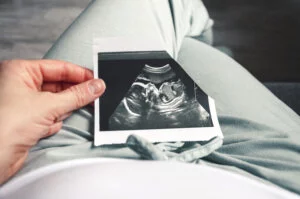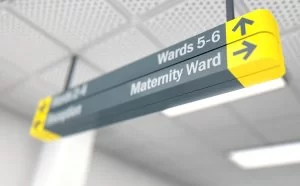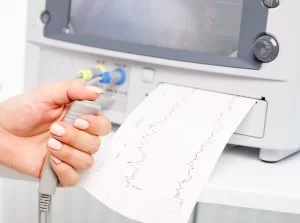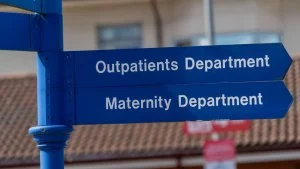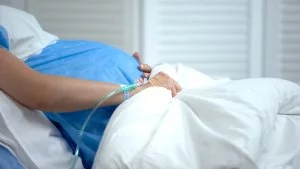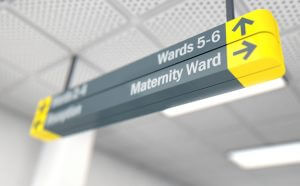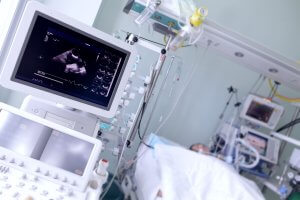Claim against Bradford Teaching Hospitals NHS Foundation Trust
23 Nov 2023 | Elline Demetriou
Table of Contents
Osbornes acted for a Claimant, C, in her birth negligence claim against Bradford Teaching Hospitals NHS Foundation Trust for negligent maternity care she received in 2021.
C, a young woman, fell pregnant in early 2021. She had unfortunately suffered a late miscarriage at 20+5 weeks the previous year and was classed as high-risk in her second pregnancy as a result. At her booking appointment an urgent referral was made to the pre-term birth prevention clinic but there was no capacity for C to be seen in the next 10 days. C was therefore seen by a consultant obstetrician who did not specialise in this area of obstetric medicine.
Cervical incompetence was considered a possible cause of C’s late miscarriage in 2020 therefore the plan was for C to have a cervical length scan at 16 weeks so that there could be an opportunity for suturing the cervix if required. However, a request for the cervical length scan was not made, neither for a follow-up ante-natal appointment.
Just over 5 weeks later, in the 21st week of pregnancy, C went to the Maternity Assessment Centre with suspected rupture of membranes. On examination, it was noted that there was a risk of pre-term spontaneous rupture of membranes. Rescue cerclage was attempted however, whilst in theatre, it was deemed unsuitable. C remained in hospital and sadly went into pre-term labour two days later, delivering a live baby. Due to the baby’s extreme prematurity, resuscitation was not attempted and the baby sadly died shortly after birth.
C suffered severe psychiatric injury as a result of her late miscarriage. The Defendant Trust promptly admitted liability, negotiations subsequently settled the case and the NHS made a payout for compensation.
If you or a loved one has experienced similar negligence, it’s crucial to know that you are not alone. Osbornes Law is dedicated to providing compassionate and expert legal support to ensure your voice is heard and your rights are upheld.
Contact us on 020 7485 8811 or fill out the form below for a confidential discussion about your experience.
Share this article
Contact
Contact Elline today
For a free initial conversation call 020 7485 8811
Email us Send us an email and we’ll get back to you
Osbornes is a very respected firm in the marketplace.
They handle really complex cases very well
The clinical negligence team are knowledgeable and professional in their approach and demonstrate a high level of skill in litigation work.
Osbornes Law offers experience in obstetric and fatal claims as well as niche cauda equina cases.
Osbornes Law is an established firm which handles a breadth of complex and high-value clinical negligence matters.
Osbornes has a skilled team of solicitors advising clients on a wide range of clinical negligence matters.
Hard working, approachable, good knowledge of clinical negligence and clients’ specific conditions
A joy to work with and always 100% client focused at all times.
The clinical negligence team at Osbornes is much lauded for its ability to ‘represent the diverse range of London-based clients
“The team is very quick and efficient in responding."
"Obsbornes Law is always client-focused and works tirelessly to obtain the best outcomes for clients."
‘They are ambitious for their clients and expect high standards from all who work with them.’
"Osbornes somehow combine the accessibility of a local firm, with the professional standards of a national or city outfit."
"Osbornes, is described as having ‘superb judgement and a medical knowledge that is second to none."
They are an excellent firm who achieve fantastic outcomes for their clients. They are also very prominent in injuries to those travelling to or from Europe. Multiple languages are spoken by the team.
Stephanie Prior is a first-rate clinical negligence specialist whose industry, great experience and medical background put her in an exceptional class.
This firm is responsive and efficient. Their rapidity in dealing with complications or hiccups is excellent.
Really great clinical negligence practice, staffed by experienced practitioners who know how NHS Trusts work. They also build great rapport with clients.’
Stephanie has developed a particularly strong reputation for her handling of birth injury claims, as well as cases concerning surgical negligence and delays in surgery.
"An excellent firm which achieves fantastic outcomes for clients."
"Stephanie Prior takes on complex cases and gets excellent results. She has a background in medicine which serves her clients well and is a realistic but tough litigator."
"Stephanie Prior is hugely dedicated, adored by her clients, tenacious, efficient and extremely knowledgeable."
"Stephanie Prior is very good with troubled clients and is easily able to make them feel at ease."
"Stephanie shows sensitivity and deals with things in an understanding way."
Osbornes provides a very intimate and personal client service which is increasingly rare in this sector.
The lawyers in the team are highly experienced and will drive cases very hard on behalf of their clients.
"Stephanie Prior has a realistic attitude to the complexities of the cases. She wins the trust of her clients and goes the extra mile to ensure they get the best outcomes."
"Stephanie Prior... manages a varied caseload, including obstetric claims, child and adult brain injury cases and fatal and non-fatal spinal cord injury cases."
"Stephanie is experienced, knowledgeable of all aspects of clinical negligence work, and strategic in running cases."
"An exceptional outfit. They take on difficult cases, fight hard and win."
"The team were extremely professional in putting my needs first. There was a joined-up approach to catering for the client, and all lawyers involved were briefed and constructive."
Stephanie Prior is always very professional and kind. Highly recommended.
Quite simply excellent, with a highly competent and well-rounded team. They understand complex medical litigation and have been our lifesavers, and we will always owe them our immense gratitude.
More Birth Injury InsightsVIEW ALL
- 5.1.2024
Delayed Pre-Eclampsia Diagnosis Resulting in Tragic Baby Loss
Introduction to the Case Nick Leahy, Associate in our Clinical Negligence department, has recently settled a birth injury claim against...
Read more - 23.11.2023
Claim against Bradford Teaching Hospitals NHS Foundation Trust
Osbornes acted for a Claimant, C, in her birth negligence claim against Bradford Teaching Hospitals NHS Foundation Trust for negligent...
Read more - 31.8.2023
Hyponatraemia – Symptoms, Causes & Negligence
What is hyponatraemia? Hyponatraemia is a condition where sodium levels fall below a certain level, which can be dangerous. All...
Read more - 23.3.2023
Private Pregnancy Scans and Substandard Care
In the news, it has been reported that private clinics that offer pregnancy scans to women are not meeting the...
Read more - 7.3.2023
5-figure settlement for infusion leak to mother
Elline Demetriou has reached another successful outcome for a Claimant, who pursued a post C-section birth injury to mother claim...
Read more - 9.2.2023
Perineal Tear case settles for 6-figure sum
Stephanie Prior recently settled a claim relating to a woman who delivered her baby after a traumatic labour. Her son...
Read more - 2.10.2022
Tragic Case Involving a Home Water Birth
Introduction to the case Nicholas Leahy is acting for a young woman who had a water birth at home and...
Read more - 21.9.2022
Are maternity services safe? – Part 2
In April last year I wrote a piece about government setting up a taskforce to look into why there are...
Read more - 8.9.2022
Poor interpretation of CTG can result in stillbirth...
Poor interpretation of a Cardiotocograph, more commonly known as a CTG, is a leading cause of stillbirth and brain injuries...
Read more - 2.9.2022
Mother & Baby Suffer Life-changing Injuries
Claim after mother and baby suffered life-changing injuries during birth Jodi is acting for both mother and baby in a...
Read more - 1.8.2022
Bereavement Following Treatment at Basildon Maternity Unit
Stephanie Prior’s death by medical negligence claim relating to the death of Gabriela Pintilie has been settled and approved...
Read more - 29.6.2022
Nottingham Maternity: Donna Ockenden to Chair Independent Inquiry
An interim report on the state of maternity services at Nottingham University Hospitals NHS Trust has just been released. However,...
Read more - 23.5.2022
Successful Claim Against King’s College Hospitals
The birth injury lawyers at Osbornes Law have recently negotiated the settlement of a case in which our client sustained...
Read more - 23.2.2022
Women from ethnic minorities experience worse maternity care
It has been reported today that the government has set up a new task force to look into why there...
Read more - 17.2.2022
999 Call Handlers Maternity Instructions Report
HSIB Report on Maternity Pre-arrival Instructions from 999 Call Handlers The Healthcare Safety Investigation Branch (“HSIB”) investigate NHS maternity incidents that...
Read more - 2.2.2022
Lifelong Consequences for Newborn Baby
Osbornes Law specialises in assisting families who have experienced birth injuries. We have represented families who have faced the loss...
Read more - 27.1.2022
Six-figure claim allows family to move home
Six-figure compensation payment for a client Jodi Newton has secured a six-figure compensation payment for her client with cerebral palsy....
Read more - 24.1.2022
Likely settlement of £15-20 million
A client who suffered cerebral palsy injuries at birth was awarded £200,000 as an interim payment in a claim against NHS...
Read more - 12.1.2022
Wrongful birth claim successfully settled
Background Our client, J, fell pregnant in October 2015 and took the difficult decision to undergo a termination. She booked an...
Read more - 2.1.2022
Justice for Family Who Faced Loss of Newborn
Osbornes Law specialises in assisting families who have experienced birth injuries. We have represented families who have faced the loss...
Read more - 17.11.2021
NICE revises guidelines on Induced labour
Most babies are born naturally at around 40 weeks gestation. However, some pregnancies continue for longer. According to data from the...
Read more - 2.10.2021
Compensation supports rehabilitation and housing
Six-figure sum supports rehabilitation and housing. Jodi achieved a six-figure sum compensation for her client with cerebral palsy. The financial...
Read more - 20.7.2021
Osbornes Successfully Settle Wrongful Birth Claim
Nicholas Leahy, clinical negligence lawyer at Osbornes Law has recently negotiated the successful settlement of a wrongful birth case. Our...
Read more - 1.7.2021
Stillbirth following water birth at home
Nicholas Leahy acted for a young woman who had a water birth at home and two midwives were allocated to...
Read more


